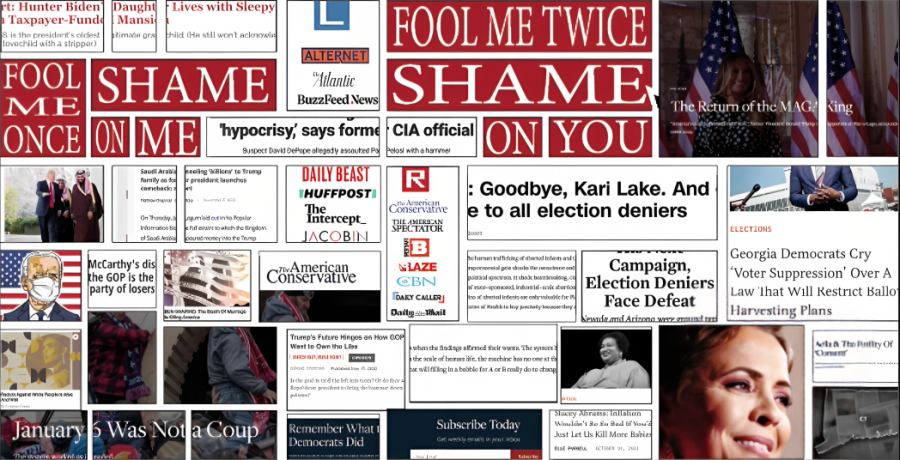Fool Me Twice, Shame on You
In a fraction of a second, you can obtain 3,160,000,000 hits pertaining to the keyword “politics,” already sorted with the highest-value sources—designated by relevance, quality, specificity and context—at the top.
Never before has a generation had such unbound access to such boundless information. The scale of it is cosmic—inconceivably vast. The Internet has become a major political news source for countless Americans and within this vast domain are innumerable news media sources locked in constant competition for viewership.
In the United States, in the interest of the freedom of the press, this struggle for online engagement exists unchallenged, unobstructed and uncensored. As a result, the information that individuals consume is, for the most part, within their own control.
This high choice media environment has given rise to highly partisan and ideological news sources in efforts to appeal to specific audiences. On either end of the political spectrum—miles from middle ground—you will find media that can be described only as propaganda; in between these two poles are countless websites, channels and blogs representing every political ideology imaginable—with the corresponding presentations of facts.
According to a 2016 study by Kelly Garrett, Brian Weeks and Rachel Neo, it would be inaccurate to assume that consumers of any media sources are wholly insulated from those views that differ from their own. Although we do have incredible information-gathering power, there is unavoidable exposure to bias, to which all individuals are susceptible. And just as conspiracists cannot wholly avoid the facts presented by the media—take flat-earthers, who are routinely subjected to evidence that the Earth is in fact spherical yet still convinced of its two-dimensional nature—the individual cannot entirely tailor what they are exposed to, nor can they wholly avoid misinformation presented by the media. It is an easy thing to be misinformed; all it takes is a change in the axis of a graph, a CNN reporter referring to the Democratic party as “we” instead of “they” or an argument so eloquently presented that the facts are obscured.
Take the case of the 2020 presidential election: a well-known and well-publicized example of political misperception being promoted (successfully) by the media. In all objectivity, this election was neither fraudulent nor corrupt. The validity of the results, indicating President Biden’s victory, was well-established and authenticated.
Despite the authenticity of the results being widely-publicized by a wide range of news sources across the political spectrum, many Americans clung stubbornly to the belief that the results were forged. They held onto these beliefs because this alternate reality (in which ballots were burned, voters were conjured out of thin air and the Democratic Party conducted a nationwide rigging of polling machines) was also publicized. Americans were living in two different realities: one in which Joe Biden had adhered to the democratic process and rightfully held the presidential seat and another in which a usurper had taken the White House through subterfuge and deceit.
This distortion of facts had its intended consequence, driving the “us vs. them” mentality to dangerous heights and culminating in the Jan. 6 insurrection, in which Trump supporters stormed the capital—intending to reinstate former President Trump to office. In subsequent reporting of the attempted coup, some media outlets condemned the actions, while others praised the potential usurpers for their efforts to “uphold democratic ideals” (as they moved to upend the democratic process). How can a terrifying two-thirds of the Republican party be convinced of the falsity of the “big lie” when their most trusted media sources refuse to refute election fraud allegations?
The state of being informed is, without contest, the most essential quality within the population of a democratic nation. If citizens are unable to agree upon the political realities meriting their consideration, how can they make a fair judgment? If you and I cannot agree on whether or not a weapon of mass destruction has been deployed in a foreign land, how can the two of us thoughtfully determine our best course of action? The personal context by which we approach a problem may differ, but our view of reality—I cannot exaggerate this enough—must be the same.
The evolution of online media is dangerous. Anyone can make any claim, and make that claim available to anyone and everyone. Three individuals in my personal social network repost an infographic containing false information to a combined audience of over a thousand people without any concerted effort—without even noticing. Now imagine the scale of misinformation when it is coming from a highly coordinated, well-funded and intrinsically motivated media conglomerate.
At the surface of the problem are the misinformed: those whose perceptions of reality are most susceptible to manipulation, those whose political frustration can be whipped into frenzied rage, those who could be inspired to commit violence with no factual or rational justification (like beating an innocent man with a hammer in the comfort of his home for the supposed crime of being married to the speaker of the house). However, the blame lies not with the individual, as at the root of the problem are the purveyors of misinformation: the media outlets sacrificing credibility for a reliable, constant audience. The intentional dissemination of false information is despicable, and irrevocable. There is no taking it back. Already, the propagation of Donald Trump’s “big lie” in 2020 has had lasting consequences, corroding the faith of many voters in future election results and dividing our most powerful politicians into two camps: the sane and the election-deniers. Two camps which will become increasingly alienated as Trump runs for re-election on a platform based in untruth within a party that has made a habit of denying those facts that do not suit them and inside a media system that allows—even encourages—the dissemination of false information.
This is not a call for censorship. It would be no solution to give any government or organization the power to limit what information is available or how that information can be presented. Rather, it is a call for critical thinking. Anything that has been published has an intention behind it, and the vast majority of political coverage intends to convince you of something (with varying degrees of subtlety). This is not a world in which we have the luxury to blindly accept information as fact. It is up to us to forge our beliefs and opinions rationally, and of our own volition.










